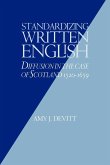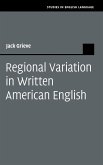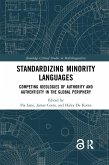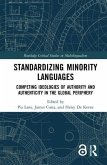This book offers a new view of the linguistic process of standardization, the movement of specific language features towards uniformity. Drawing on theoretical arguments and empirical data, it examines the way in which linguistic conformity develops out of variation, and the textual and social factors which influence this process. After defining and clarifying the general theoretical issues involved, Professor Devitt takes as a specific case study the standardization of written English in Scotland in the sixteenth and seventeenth centuries, and shows that standardization is a gradual process, that it encompasses periods of great variation and that it occurs concurrently with sociopolitical shifts. The interrelationship of linguistic features, genres and social pressures shapes the nature and direction of standardization. This is a readable and accessible book which will appeal to those involved in the study of Scots-English, and is of importance for linguistic methodology and the study and teaching of literacy.
Table of contents:
List of figures; List of tables; Acknowledgments; 1. Linguistic standardization and Scots-English; 2. The linguistic diffusion of five variables; 3. Anglicization and theories of language change; 4. (Con)Textual variables and anglicization; 5. Conclusions; Appendices; Notes; Bibliography; Index.
This book offers a new view of the linguistic process of standardization, the movement of specific language features towards uniformity. Drawing on theoretical arguments and empirical data, it examines the way in which linguistic conformity develops out of variation, and the textual and social factors which influence this process.
This book offers a new view of the linguistic process of standardization, the movement of specific language features towards uniformity.
Hinweis: Dieser Artikel kann nur an eine deutsche Lieferadresse ausgeliefert werden.
Table of contents:
List of figures; List of tables; Acknowledgments; 1. Linguistic standardization and Scots-English; 2. The linguistic diffusion of five variables; 3. Anglicization and theories of language change; 4. (Con)Textual variables and anglicization; 5. Conclusions; Appendices; Notes; Bibliography; Index.
This book offers a new view of the linguistic process of standardization, the movement of specific language features towards uniformity. Drawing on theoretical arguments and empirical data, it examines the way in which linguistic conformity develops out of variation, and the textual and social factors which influence this process.
This book offers a new view of the linguistic process of standardization, the movement of specific language features towards uniformity.
Hinweis: Dieser Artikel kann nur an eine deutsche Lieferadresse ausgeliefert werden.








